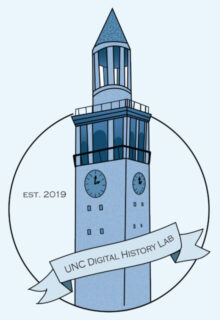Newsletter – Wednesday, February 8, 2023
Dear UNC History Community,
Thank you to everyone that attended the Digital Storytelling workshop yesterday! We enjoyed seeing you and all of your digital humanities projects.
1. New Podcast Episode – “Turning the Map”
The Digital History Lab at the University of North Carolina at Chapel Hill presents The Past Presented — a show about the tools, techniques, and technologies scholars use to study the past and conversations with the folks who use them. In Episode One, “Turning the Map”, PhD Candidate Nathan Gill talks to co-hosts Maddie McGrady and Sarah Miles about his research on human-environment relationships and systems of labor in the Ecuadorian Andes. In particular, he talks about how GIS mapping allowed him to turn the map – literally and figuratively – and reconsider assumptions about human relationships and the built environment around one of the oldest functioning haciendas in Ecuador: Guachalá.
2. Digital Mapping Project: Slave Revolt in Jamaica
Slave Revolt in Jamaica, 1760-1761 is a digital mapping project from Harvard Professor Vincent Brown. Brown animated the movements of the over 1500 enslaved people that participated in the eighteen month revolt in an effort to reframe the narrative from that of the slaveholder to that of the rebels. Through written elaboration of the events and accompanying visuals, the project “…offers an illuminating interpretation of the military campaign’s spatial dynamics.” Vincent Brown will also be speaking at the UNC Stone Center for Black Culture and History on February 22 at 6:30 p.m. You can visit the project here and find more information about the event here.
3. Historical Mapping & Contemporary Legacies: Racial Restrictive Covenants Project
Professors at the University of Washington and Eastern Washington University, under the supervision of the Washington State Legislature, have started researching the historical property deeds in the state. They aim to create a digital platform to “[identify] and [map] neighborhoods marked by racist deed provisions and restrictive covenants” and then study the modern impacts of these residential laws. You can check out the project here.
Make sure to contact the Digital History Lab if there are any skills you want to learn, need support with your own digital history projects, or are interested in our podcast!
Thanks for reading,
The DHL Team (Cameron, Madeleine, & Sarah)
